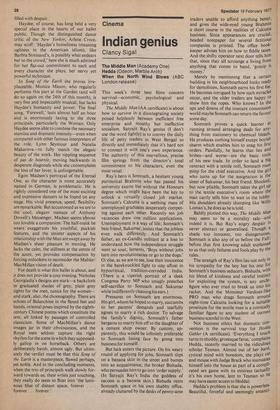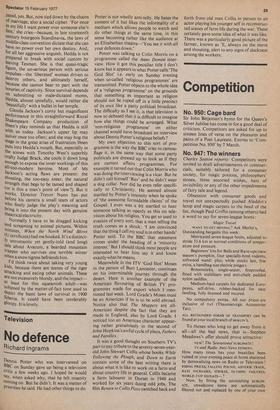Cinema
Indian genius
Clancy Sigal
The Middle Man (Academy One) Hedda (Odeon, Marble Arch) When the North Wind Blows (ABC London release) This week's three best films concern survival—economic, psychological and physical.
The Middle Man (AA certificate) is about how to survive in a disintegrating society poised helplessly between inefficient free enterprise and mouthy but ineffective socialism. Satyajit Ray's genius (I don't use the word lightly) is to convey the daily life of petty traders in West Bengal so directly and immediately that it's hard not to connect it with one's own experience. The authority of this marvellous, precise film springs from the director's total commitment to his characters, even the most venal.
Ray's hero is Somnath, a hesitant young puritanical Brahmin who has passed his university exams but without the Honours degree which might have been the key to unlock a virtually closed job market. Somnath's Calcutta is a seething mass of unemployed graduates desperately competing against each other. Recently ten job vacancies drew one million applications. Unemployment is a way of life; Somnath's best friend, Sukumar, insists that the jobless even walk differently.. And Somnath's father, an ex-Gandhi militant at a loss to understand how the independence struggle went so sour, laments, 'Boys without jobs turn into revolutionaries or go to the dogs.' 0.. else, as we are to see, lose their innocence in the bareknuckled fight to stay afloat in hypocritical, tradition-corroded India. (There is a viperish portrait of a sleek Congress Party MP who smugly preaches self-sacrifice to Somnath and Sukumar while indifferently cleaning his ears.) Pressures on Somnath are enormous. His girl, whom he hoped to marry, succumbs to her parents' demands and tearfully agrees to marry a rich doctor. To salvage the family's dignity, Somnath's father bargains to marry him off to the daughter of a cement shop owner. By custom, apparently, this would be infinitely preferable to Somnath losing face by going into business for himself.
But luck enters the picture. On his weary round of applying for jobs, Somnath slips on a banana skin in the street and bumps into an acquaintance, the broker Bishuda, who persuades him to go into 'order supply.' (In Satyajit Ray's India the goddess of success is a banana skin.) Bishuda rents Somnath space in his own shabby office, already cluttered by the desks of penny-ante
traders unable to afford anything better, and gives the wide-eyed young Brahmin a short course in the realities of Calcutta business. Since appearances are crucial, headed notepaper for several fictitious companies is printed. The office bookkeeper advises him on how to fiddle taxes. And the shifty operator next door tells him that, since they all scrounge a living from anything that comes to hand, 'gossip is money.'
Merely by mentioning that a certain building in his neighbourhood looks ready for demolition, Somnath earns his first fee. He becomes intrigued by how such miracles occur, and the older traders are happy to show him the ropes. Who knows? In the ups and downs of the insecure commission world maybe Somnath can return the favour some day.
Somnath proves a quick learner at running around arranging deals for anything from stationery to chemical bleach. He produces nothing himself except boyish charm which enables him to snag his first • orders. Painfully, he learns that lies and bribes—and worse—are the basic tools of his new trade. In order to land a big contract with a textile mill, Somnath must pimp for the chief executive. And the girl who turns up for the assignation is the sister of Sukumar, his best friend. Shocked, but now pliable, Somnath takes the girl uP to the textile executive's room where the man curtly tells him to wait in the lobbY• His shoulders already slumping like Willy Loman's, he does as he is told.
Baldly plotted this way, The Middle Man may seem to be a morality tale—and indeed it is. But Ray's angry despair is never abstract or generalised. Though a shade too innocent, too disingenuous. Somnath is also any of us before the Fall: before that first knowing adult explained to us that only failures and fools play by the rules.
The strength of Ray's film lies not only in his sympathy for the boy but his zest for Somnath's business seducers. Bishuda, with his blend of kindness and careful instinct for exploiting the system, is any unclefigure who ever tried to break us into his racket. And the Monsieur Verdoux-like PRO man who drags Somnath around night-time Calcutta looking for a suitable prostitute for the textile man is a comicallY familiar figure to any student of current business scandal in the West.
Not business ethics but domestic convention is the survival trap for Hedda Gabler (A certificate). 'Everything I touch turns to shoddy, grotesque farce,' complains Hedda, recently married to the ridiculoUs scholar Tesman. Almost out of her hard, cynical mind with boredom, she plays cat and mouse with Judge Brack who insinuates himself into the house as part of a comPli" cated sex game with its mistress (actuallY it's his own home, lent to Tesman so he may have easier access to Hedda).
Hedda's problem is that she is powerless. Beautiful, forceful and seemingly emanci
pated, yes. But, now tied down by the chains of marriage, also a social cipher. 'For once in my life I want power over someone else's fate,' she cries—because, in late nineteenth century bourgeois Scandinavia, the laws of middle-class convention dictate that she can have no power over her own destiny. And, for all her aggressive anguish, Hedda is not prepared to break with social custom by leaving Tesman. She is that quasi-tragic ngure, the un-serious person with serious Impulses—the 'liberated' woman driven to destroy others, and ultimately herself, because she cannot bear to part with the luxuries of captivity. Since survival depends on submitting to male-dictated mores, Hedda, almost spitefully, would rather die beautifully' with a bullet in her temple.
Glenda Jackson's corny but magnificent Performance in this straightforward Royal Shakespeare Company production of Ibsen's play reminds us that Hedda is still With . us today. Jackson's upper lip may quiver once too often; and she may hog the stage in the great arias of frustration Ibsen Puts into Hedda's mouth. But, especially in the scenes with Timothy West's superbly Crafty Judge Brack, she cools it down long enough to expose the inner workings of this all-too-modern heroine. Most of Ms Jackson's acting flaws are present : the Shouting, the too-easy sneer, the natural strength that begs to be tamed and shaped (or is this a man's point of view?). But it works. Director Trevor Nunn has put before his camera a small team of actors who finely judge the play's meaning and bring it into the present day with genuine theatrical electricity.
Normally I have to be dragged kicking and screaming to animal pictures. Within minutes, When the North Wind Blows (U certificate) had me hooked. It's a distinctly unromantic yet gently-told (and long) tale about Avacum, a bearded mountain trapper who survives one terrible winter When a snow tigress befriends him.
I'd think twice about taking very young kids, because there are Scenes of the tiger attacking and eating other animals. These are not excessively bloody, and the impact_ at least for this squeamish adult—was softened by the matter-of-fact tone used to depict the basic laws of survival in 1900 Siberia. It could have been intolerably gloopy. It is lovely.



































 Previous page
Previous page